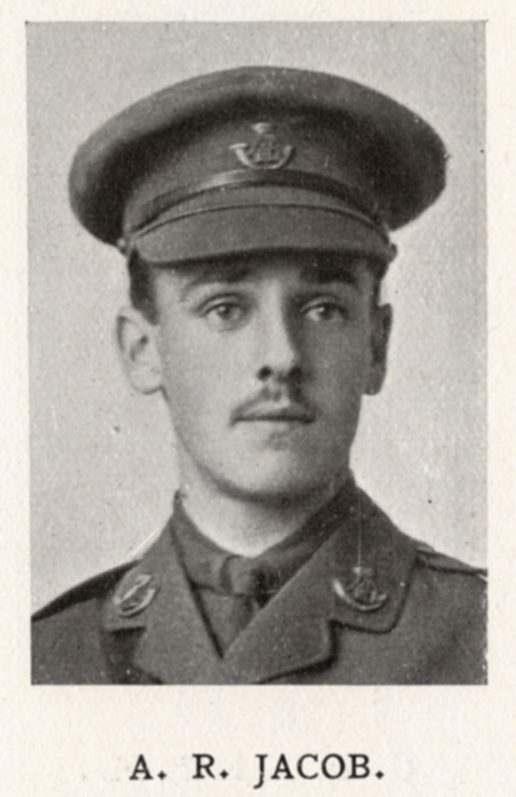Jacob, AR
(1893 - 1916)

Key Facts
DATE OF BIRTH:
4th October 1893
YEARS ATTENDED THE COLLEGE:
1906 - 1912
HOME ADDRESS WHEN AT THE COLLEGE:
46 Victoria Road, Gipsy Hill
REGIMENT
4th Reserve Battalion, Durham Light Infantry
FINAL RANK:
2nd Lieutenant
DATE OF DEATH:
18th September 1916
AGE AT DEATH:
22
WHERE HE DIED (or was wounded)
Heilley, Somme
LOCATION OF GRAVE OR MEMORIAL:
Heilly Station Cemetery, Mericourt-L'Abbe. IV F 14
2nd Lieutenant Anstey Ross Jacob
Born in Calcutta, India, on October 4th 1893, Anstey was the ninth of ten children born to Stephen Jacob, a member of the Indian Civil Service, and his wife, Clara. His father passed away in 1898, not long after Anstey’s fifth birthday, and the family subsequently came to London, ultimately settling in Gipsy Hill. He earned a scholarship to the College in 1906, making him the fourth of five Jacob brothers to come to Dulwich. He went on to earn a Senior Scholarship in 1909, and when he left in the summer of 1912 was awarded a special leaving prize by the Governors. He went on to St. John’s College, Cambridge, where he had once more earned himself a scholarship.
Upon the outbreak of war in 1914 Anstey attempted to volunteer for front line service, but was refused on medical grounds, because of the aftereffects of a leg injury he had suffered playing rugby whilst at Dulwich. He instead joined the Cambridge University O.T.C. and was assigned to act as musketry instructor for the 6th Battalion of the Dorsetshire Regiment. At the end of 1914 he underwent surgery to correct the issue with his leg and the following June, upon his recovery, was granted a commission in the Durham Light Infantry. He spent the following year serving in England, mostly in the North East, where he was appointed Battalion Musketry Officer. In July 1916 he went over to the front for the first time; he spent his first three months or so in the Arras sector before being reassigned to the Somme that September. Mere days later, on September 17th, he was leading his men in an assault on German lines when he was severely wounded by machine gun fire, dying from his wounds in a clearing hospital the following day.